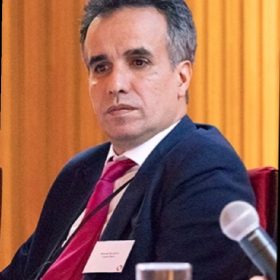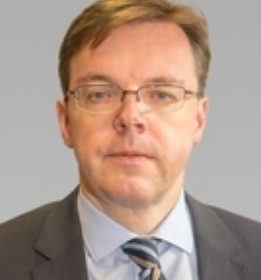
Day 2: Friday 17th May
08.30 – 09.00
Morning Welcome Coffee
09.00 – 09.45: Permanence product design and pricing
- Missing point in carbon capture markets: certainty and duration of CO2 capture
- Mitigation-Duration Forward (MDF) contract specification
- Problem statement: cost to capture CO2 for a given duration with certainty
- Modelling integrating physical, financial, and technology factors
- Numerical examples

Chris Kenyon:
Director: Head of XVA Quant Modelling, MUFG Securities EMEA plc
Chris Kenyon: Director: Head of XVA Quant Modelling, MUFG Securities EMEA plc
Dr Chris Kenyon is head of XVA Quant Modelling at MUFG Securities EMEA plc. Previously he was Head of XVA Quantitative Research at Lloyds Banking Group, head quant for Counterparty Credit Risk at Credit Suisse, and (post-crisis) Head of Structured Credit Valuation at DEPFA Bank Plc. He is active in XVA research, introducing KVA and MVA, with Andrew Green in 2014-15, their accounting treatment in 2016-17, as well as double-semi-replication and behavioural effects on XVA. He contributes to the Cutting Edge section of Risk magazine (most-cited author in 2016; 5th most-published author 1988-present in 2017), co-edited “Landmarks in XVA” (Risk 2016). He has a Ph.D. from Cambridge University and is an author of the open source software QuantLib.
09.45 – 10.30: How to identify portfolio exposure to transition risk and opportunities
Global investment in the low-carbon transition surged past $1.7 trillion last year, or nearly 2% of global GDP, with the cost of key technologies, such as solar, wind, batteries and electric vehicles dropping dramatically. The impact of low-carbon asset deployment is starting to be felt, leading to heightened climate transition risk for incumbent companies, but also, unique opportunities for new entrants and first movers. Navigating the energy transition requires robust exposure assessment and scenario analysis to control for potential changes in policy, technology and consumer preferences. In this session, we take a deep dive into two key questions for investors:
- How to identify portfolio exposure to transition opportunities?
- How climate scenarios can help limit portfolio exposure to transition risk?

Mike Daly:
Senior Data Lead, Transition Risk, BloombergNEF
Mike Daly: Senior Data Lead, Transition Risk, BloombergNEF
10.30 – 11.00: Morning Break and Networking Opportunities
11.00 – 11.45: Apply Climate Scenario Analysis and Modelling in a Practical way across Portfolios

David Jessop:
David Jessop: Head of Investment Risk at Columbia Threadneedle Investments EMEA APAC
David is the Head of Investment Risk at Columbia Threadneedle Investments EMEA APAC. Previously the Global Head of Equities Quantitative Research at UBS. His areas of research include portfolio analysis and construction, style analysis and risk modelling. He also helps clients understand, use and implement the quantitative tools available from UBS. David joined UBS in 2002. Prior to this, he spent seven years at Citigroup as Head of Global Quantitative Marketing. Before moving to the sell side he spent six years at Morgan Grenfell Asset Management, where he managed index funds, asset allocation funds and also an option overwriting fund.
David graduated from Trinity College, Cambridge with an MA in Mathematics.
11.45 – 12.30: Panel Discussion: Climate Risk Modelling: A Practitioner Perspective

Rutang Thanawalla:
Visiting Fellow, London Institute of Banking & Finance & Strategic Adviser, Climate Tech
Rutang Thanawalla: PhD, Visiting Fellow, London Institute of Banking & Finance & Strategic Adviser, Climate Tech

Chithra Namboodiri:
Global Head of ESG Risk Analytics, HSBC
Chithra Namboodiri: Global Head of ESG Risk Analytics, HSBC

Mourad Berrahoui:
Managing Director Global Head of Counterparty Pricing and Risk Analytics, Lloyds Banking Group
Mourad Berrahoui: Managing Director Global Head of Counterparty Pricing and Risk Analytics, Lloyds Banking Group
I am, Head of Counterparty Credit Risk Modelling a LBG Group. In addition, I am sitting at executive risk committee at LCH for the last 4 years, representing LBG group.
I have more than 20 years’ experience in quantitative modelling as front office quant, head of model validation and now head of CCRM, worked for different banks like Natixis, Commerzbank, Morgan Stanely, Nomura, and for the last 7 years LBG. In addition, I worked for couple of years as senior trader on structured credit products.
I authored several papers that have been published in Risk magazine on various topics like new concept of Potential Future Exposure, SA CCR Capital, Wrong Way Risk and more recently I published on the topic of quantitative climate finance.
I hold an MBA from Henley Business School and two DEAs (MSc) in France. One on Probability and Finance from Univestiy Marie Curie and the second one on Economy from Ecole NOrmale Superieure de Cachan.
12.30 – 13.30: Lunch
13.30 – 14.15: Navigating the Climate Frontier: Unveiling the Impact of Transition and Physical Risks on Loan Portfolios
During this session we delve into the forefront of climate risk management. In this presentation, we will explore tangible and practical insights into how transition and physical risks are reshaping the landscape for loan portfolios. By examining real-world use cases, we’ll uncover the ways in which transition risk disrupts the stability of home-owners, while physical risk poses challenges to both corporate entities and individuals. Brace yourself for an engaging session that goes beyond theory, providing actionable strategies to fortify loan portfolios against the evolving climate challenges. Don’t miss the opportunity to gain valuable insights into the dynamic interplay of climate risks and financial landscapes.

Maurits Bakker:
Risk Lead Benelux, SAS
Maurits Bakker: Risk Lead Benelux, SAS
Maurits is a seasoned Senior Risk Professional with an expansive 20-year career spanning Europe, the UK, and North America, specializing in risk management solutions within the financial services sector. Maurits talks about Risk challenges with all his clients in the Benelux and Climate Risk is most often on the agenda. His most recent research is on both transition and physical risks and how it impacts home- and business owners (and bank’s loan portfolios).
14.15 – 15.00: Modelling Climate Risk for Reinsurance
Primary insurers require the reinsurance giants to participate in their underwriting risks of meteorological and other catastrophic impacts to be able to address the market. The reinsurance market is currently heavily in favour of reinsurers both with respect to price and to underwriting terms. The catastrophe bonds market has printed substantial profits since the last serious meteorological event (which occurred September 2022).
Risk management rests on analysis of historic events (such as Miami 1926) and advanced simulation. A number of techniques and critical uncertainties around climate modelling and adverse weather modelling from first physical atmospheric principles as well as mathematical and computational bottlenecks will be investigated.

Erik Vynckier:
Interim Chief Executive, Foresters Friendly Society
Erik Vynckier: Interim Chief Executive, Foresters Friendly Society
Erik Vynckier is board member of Foresters Friendly Society and chair of the Investment Committee, following a career in investment banking, insurance, asset management and the petrochemical industry. He has been Chief Investment Officer and Chief Executive Officer and frequently consults in investment management, quantitative risk management and derivatives.
He co-founded EU initiatives on high performance computing and big data in finance and co-authored “High-Performance Computing in Finance” and “Tercentenary Essays on the Philosophy and Science of Leibniz”. Erik graduated as MBA at London Business School and as chemical engineer at Universiteit Gent.
15.00 – 15.15: Afternoon Break and Networking Opportunities
15.15 – 16.00: Climate Risk Stress Testing: Creating tangible scenarios
The impact of climate change on the financial system is a concern to banks and to regulators alike, given its potential impact on the long-term quality of assets and collateral in the portfolio of banks. Given the longer-term nature of impact and constraints in modelling ability for climate risk impact, stress testing has been the first weapon of choice in quantifying impact. During recent years, industry practices have evolved, and fora such as the CFRF start collecting proven industry practices, which will sooner or later translate into a normative footprint.

Thomas Obitz:
Director, Risk Transform
Thomas Obitz: Director, Risk Transform
Thomas Obitz is a management consultant and senior advisor on risk and regulatory driven change. He has designed the operating model transformation in the FRTB implementation of a major global bank and worked on various both operational and quantitative aspects of the regulation.
Thomas has more than 20 years of experience in the Financial Services industry in roles including organizational change, operating model transformation and IT transformation, working as a consultant, project manager and business architect. He has a background in Mathematics, worked for a Big 4 consultancy, is certified as a Financial Risk Manager (GARP FRM) and holds a TOGAF 9 certification. He is founder of RiskTransform, a niche consultancy supporting banks in integrating risk, operating model and IT change, and based in London.
Thomas has published on various aspects of the FRTB and on broader topics of risk change. Special areas of interest are the operational changes required to manage the impact of the regulation, and the data and data quality implications.